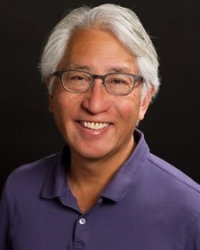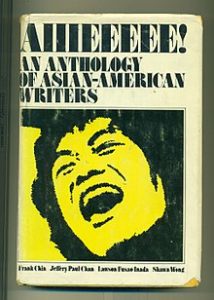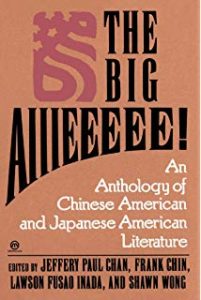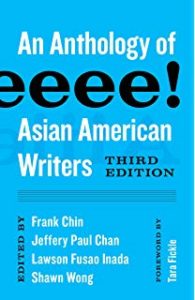Contributed by special guest author/editor Shawn Wong
 Shawn Wong is the author of two novels, Homebase and American Knees, and editor or co-editor of six anthologies of Asian American or American multicultural literature. He is a professor of English and Cinema & Media Studies at the University of Washington in Seattle. His website is: ShawnWongWrites.com
Shawn Wong is the author of two novels, Homebase and American Knees, and editor or co-editor of six anthologies of Asian American or American multicultural literature. He is a professor of English and Cinema & Media Studies at the University of Washington in Seattle. His website is: ShawnWongWrites.com
In the summer of 1969, while an undergraduate English major at UC Berkeley, I decided that I wanted to be a novelist. The problem was that I was the only Asian American writer I knew in the world. No professor or high school literature teacher had ever assigned a book by an Asian American writer or even mentioned the name of an Asian American writer in my literature classes. There were no Asian American students in my creative writing classes. I was it.
Think about that for a second. No Asian American literary organizations, no Asian American studies classes, no subject category in the library under “Asian American Literature,” no Google. In fact, it didn’t even occur to me to ask the damn question, “Are there any Asian American writers?” until I was 20 years old and unpublished myself. When I went to my American literature professor at Berkeley and asked him, he said there weren’t any Asian American writers.
To make a long story short, I did not believe him and decided to begin a search. I found Jeff Chan, then a graduate student and a teacher in the newly formed Ethnic Studies at San Francisco State College who introduced me to Frank Chin who had just returned to Berkeley from Seattle where he had been a news writer for a local television station. Together, Jeff, Frank and I discovered Lawson Inada’s work in an anthology of Fresno poets in 1970. We called him at his home in Ashland, Oregon and he drove down to Berkeley the very next weekend to meet us.
 Jeff, Frank and Lawson were all older than me by 8 to 12 years. I was still in college. By the time I graduated in 1971, we had the manuscript to Aiiieeeee! in our hands. We had found 14 writers to put in the anthology that my professors said did not exist. You might say that I majored in Asian American literature except there were no classes, no teachers, no grades, not even independent study credit. My side gig was Asian American literature while I was still writing papers on Spenser and Shakespeare and Yeats. I ended up teaching myself the subject that I would eventually teach in my first job as a college professor in 1972 at Mills College. I entered graduate school in Creative Writing at San Francisco State College in 1971 and I shopped our manuscript around to publishers without success. We often got back insulting and ignorant comments or questions such as inquiring whether or not the stories in the anthology were in translation or that the “least ethnic pieces were the best” or that the stories were interesting as social history rather than literature.
Jeff, Frank and Lawson were all older than me by 8 to 12 years. I was still in college. By the time I graduated in 1971, we had the manuscript to Aiiieeeee! in our hands. We had found 14 writers to put in the anthology that my professors said did not exist. You might say that I majored in Asian American literature except there were no classes, no teachers, no grades, not even independent study credit. My side gig was Asian American literature while I was still writing papers on Spenser and Shakespeare and Yeats. I ended up teaching myself the subject that I would eventually teach in my first job as a college professor in 1972 at Mills College. I entered graduate school in Creative Writing at San Francisco State College in 1971 and I shopped our manuscript around to publishers without success. We often got back insulting and ignorant comments or questions such as inquiring whether or not the stories in the anthology were in translation or that the “least ethnic pieces were the best” or that the stories were interesting as social history rather than literature.
In 1972 I won a prize in a children’s short story contest from The Council on Interracial Books for Children. Roberta Palm, an editor from Howard University Press, contacted me and asked if I had a children’s book manuscript they could see. I didn’t have a book-length manuscript, but I wrote to her and told her that I had a manuscript for an anthology. In 1974 Howard University Press published Aiiieeeee! as one of their first ten books to kick off their entrance into publishing.
 In retrospect, it’s not surprising to note that African American presses were the first to recognize the legitimacy of Asian American literature. My first three books were published by African American presses. Our anthology was reviewed everywhere from the Rolling Stone to The New Yorker to The New York Times with rave reviews. We received only two bad reviews—both from the only Asian American reviewers to review the anthology—one in Bridge Magazine and the other in the Honolulu Advertiser. One reviewer took exception to the fact that we stated there was Asian American literary English specific to the author’s ethnicity, a kind of street English, and the other reviewer noted all the Asian people we had not included even though he could not name the names of the excluded writers.
In retrospect, it’s not surprising to note that African American presses were the first to recognize the legitimacy of Asian American literature. My first three books were published by African American presses. Our anthology was reviewed everywhere from the Rolling Stone to The New Yorker to The New York Times with rave reviews. We received only two bad reviews—both from the only Asian American reviewers to review the anthology—one in Bridge Magazine and the other in the Honolulu Advertiser. One reviewer took exception to the fact that we stated there was Asian American literary English specific to the author’s ethnicity, a kind of street English, and the other reviewer noted all the Asian people we had not included even though he could not name the names of the excluded writers.
 The University of Washington Press has published the third edition of Aiiieeeee!: An Anthology of Asian American Writers, a groundbreaking volume that shows how Asian Americans fought for—and seized—their place in the American literary canon. This new 3rd edition celebrates the 45th anniversary of the anthology and includes material from the previous editions of the book from four different publishers. Professor Tara Fickle (University of Oregon) will be designing a website, featuring a treasure trove of archival materials collected during the compilation of the anthology in the early 70s, including correspondence and interviews with authors, correspondence between the four editors, as well as other documents, photographs, reviews, unpublished versions of the original introduction and other valuable primary materials that tell the story of the rediscovery of Asian American literature that our teachers said did not exist. Get a 30% discount if you order before December 31, 2019 using the code WST30 Aiiieeeee!: An Anthology of Asian American Writers.
The University of Washington Press has published the third edition of Aiiieeeee!: An Anthology of Asian American Writers, a groundbreaking volume that shows how Asian Americans fought for—and seized—their place in the American literary canon. This new 3rd edition celebrates the 45th anniversary of the anthology and includes material from the previous editions of the book from four different publishers. Professor Tara Fickle (University of Oregon) will be designing a website, featuring a treasure trove of archival materials collected during the compilation of the anthology in the early 70s, including correspondence and interviews with authors, correspondence between the four editors, as well as other documents, photographs, reviews, unpublished versions of the original introduction and other valuable primary materials that tell the story of the rediscovery of Asian American literature that our teachers said did not exist. Get a 30% discount if you order before December 31, 2019 using the code WST30 Aiiieeeee!: An Anthology of Asian American Writers.
